Poems of Liberty
Call for Contributions: Poems of Liberty – Human Rights Edition 2022

What comes to your mind, when you think about poems? For some, poems are no more than the countless lines they had to read in school, an anecdote by that one family member at a celebration or their aunt’s inspirational quote on a nature backdrop on Facebook. For others, it opens up a whole world of opportunities, stories, adventure and amazement. When you find a poem that speaks to you, it can feel like the whole world pauses for a second and gives you the chance to explore a feeling, memory or even just let your mind wander. There is something innately beautiful in poems, which influences us.
Advertisers use rhymes so we remember slogans better, and politicians use music to elicit emotions in a crowd. Poems work! Great orators, such as Churchill used them often, and with immense success. Poems parodied tyrants when no one else dared to, poems forever preserved the memories of heroes, and poems declared love among countless couples.
Poems work to convey ideas, emotions and stories, which is why on this International Human Rights Day 2022 the European Dialogue Programme of the Friedrich Naumann Foundation for Freedom and the Hungarian Free Market Foundation are launching their second edition of “Poems of Liberty” and we are looking for YOUR contributions!
This year, we are focusing on three topics that have been defining for human rights in Europe in 2022: Press Freedom, Diversity and Disinformation & Diversity. You will find a brief description of both categories and the terms of entry below. 2 entries will be selected and published for every category and the authors will receive a 250€ honorary fee. As usual, the poems will be accompanied by a written analysis of the challenges Europe faces with regards to the issues, as well as comics drawn by our Animate Europe comic artists.
Submission Categories
Press Freedom:
The protection and promotion of press freedom is an ongoing task for liberals everywhere. Intimidation, arrest, and repressive laws designed to combat alleged false reporting are only a few challenges that many European media professionals deal with daily. In this context, the public health emergency resulting from the COVID-19 pandemic has created a dangerous opportunity for the expansion of authoritarian rule in European countries, where freedom of the media has sharply deteriorated. Especially governments with authoritarian tendencies like Hungary, Romania and Bulgaria, were quick to exert pressure on the media. They introduced restrictions to access press conferences, and legislation to counter “fake news” about the pandemic situation, aimed at prosecuting media whose narrative deviated from the official government line, closed media, and jailed journalists.
Diversity:
The UN officially recognised human rights violations against LGBT+ people in its 2011 Resolution 17/19 on “Human Rights, Sexual Orientation and Gender Identity.” However, people from the LGBT+ community still face widespread discrimination in Europe every day, which can range from excluding them from blood donations or adoption to banning them from “LGBT free zones” and active persecution. In addition, the COVID-19 pandemic has highlighted their lived realities, with increased (online) abuse and hate speech, as well as some governments using them as scapegoats or using the pandemic as a smokescreen to pass discriminatory laws to marginalise them. While LGBT+ rights and openness in society are on the rise in many Member States, governments in countries like Poland and Hungary have been actively countering this development, cracking down on individuals as well as civil society. In 2020, the European Commission delivered the EU Gender Equality Strategy 2020-2025. Overall, the Commission and Parliament have made an open effort to address the breaches of their Member States and promote a more comprehensive and intersectional approach. Nevertheless, to truly better the situation of the LGBT+ community, Member States will have to step up their game in not only passing relevant laws but also ensuring that they translate into real change.
Disinformation & Democracy:
Over the past decade, the EU has experienced a variety of crises, which have put social cohesion, solidarity and, ultimately democracy to the test. Amid recent crises and elections, the term “disinformation” has been dominating public discourses and ringing alarm bells on the danger of foreign influence in domestic politics. While foreign influence and disinformation campaigns by actors such as Russia and China, be it during the EU elections or the war in Ukraine, are deeply worrying, we cannot detach this issue from the individual and local sphere. We encounter disinformation in our everyday life: The news story your friend sends you on Whatsapp, the clickbait on Facebook, the influencer on Youtube and Tik Tok. Our decisions are often influenced by other people’s opinions, and in times where everybody becomes a doctor during a global pandemic and hate against vulnerable groups spreads like wildfire on the internet, it is more important that we promote media literacy and critical thinking to reduce the spread and impact of disinformation on- and off-line.
Submission Procedure
If you would like to contribute to one (or more) or the three categories, please submit the following until 28. November 2022 via email at jana.weber@freiheit.org:
- Your poem in English
- It is possible to provide the original poem in another language, should you feel more comfortable expressing yourself in it. We, however, request you also provide an English translation of the poem, so we can publish them side by side.
- Information about your poem
- What category are you submitting for?
- Tell us a bit about the background/thoughts of your poem in a few sentences.
- Information about yourself
- Your full name, email address, physical address and bank details.
- Should your poem be selected for the publication, we will provide you with a honorary fee agreement for the sum of 250€.
